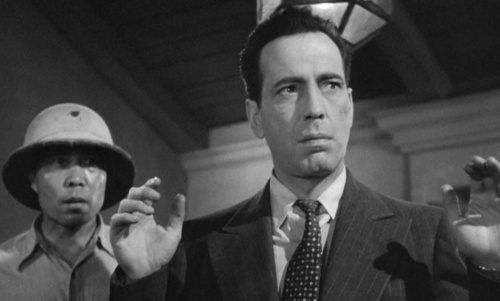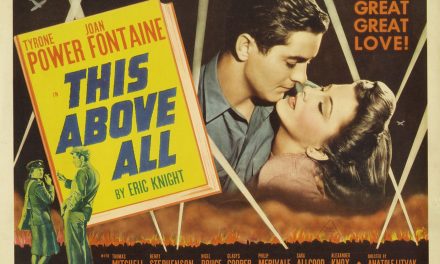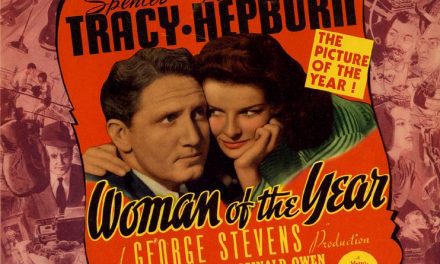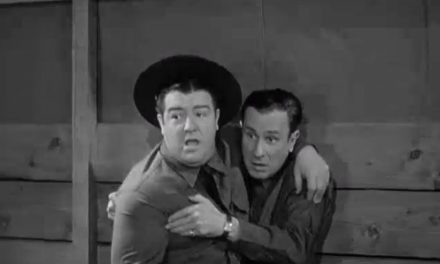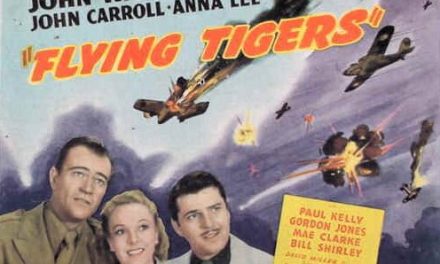An American spy posing as a dishonorably discharged army lieutenant, a Canadian woman being blackmailed by the Japanese, and a British professor entangled in Japanese efforts against the U.S. – all these characters play key roles in John Huston’s intense thriller Across the Pacific.
Across the Pacific is the story of Rick Leland (Humphrey Bogart), an army lieutenant who was supposedly kicked out of the military for stealing. After his discharge, he makes his way to Canada, where he boards a Japanese freighter headed to the American-controlled Panama Canal. Leland, we soon learn, is actually a secret agent working for the U.S. military on a mission to thwart the plans of a ring of Japanese spies. The leader of this ring, Dr. Lorenz, is a British professor whose obsession with Japanese culture has led him to working for the country’s military. Leland must prove his loyalty to Lorenz time and time again to make sure he always knows what the Japanese are planning – at one point even killing a man who boarded the ship to assassinate Lorenz in order to gain his trust. While on his journey, Leland meets Alberta Marlow, the daughter of a Canadian farmer, and they quickly begin a romance that leads to Leland discovering that she was forced to board the freighter by the Japanese spies,
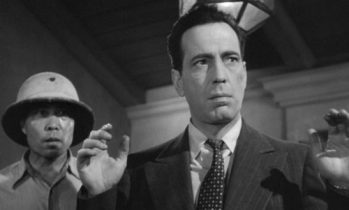
Humphrey Bogart plays Captain Rick Leland in Across the Pacific.
who are using her father as a pawn in their war efforts.
Bogart’s stellar performance helps create the tension and excitement that fill the story from start to end. As a whole, the film captures the spirit of the American people and their persistence and dedication in the face of the enemy. Leland represents the ideal patriotic American by acting in the best interest of his country at all times. One of the most suspenseful parts of Across the Pacific is Leland’s constantly turbulent relationship with Dr. Lorenz, best exhibited by Leland’s internal dilemma when having to provide information about military installations guarding the canal upon realizing that he know men stationed there. The audience is left questioning at times whether Leland is truly working in America’s best interest or if he will fall to the temptations of Lorenz and the Japanese spies.
The storyline of Across the Pacific – the Japanese launching a surprise attack on a strategic American possession overseas – may remind viewers of the attack on Pearl Harbor. The film has many obvious parallels to the fateful day that changed America. In fact, the original script, written before December 7, 1941, had Dr. Lorenz and the Japanese spies planning to attack Pearl Harbor rather than the Panama Canal; it was changed due to worries about the film being perceived as insensitive.
The change in location from the U.S. naval base in Hawaii to the Panama Canal Zone does little to affect the message the film sends about the Japanese and the fear that their people and the thought of another attack sends through the American people. The distrust that Leland has for all people of Japanese heritage and those who associate themselves with them is quite evident throughout the film. His suspicion of the people turns out to be warranted based on their plan to attack, reflecting the fear and hatred that most Americans have felt since Pearl Harbor.
Even without Leland’s obvious mistrust of the Japanese people he encounters, the portrayal of Japanese characters would be enough to express to viewers just how poorly the filmmakers view them. The Japanese characters in the film are portrayed as caricatures of a typical Japanese person; they all have buck teeth, coke bottle glasses, and exaggerated accents. The menacing attitudes of the Japanese characters reflects perfectly the image most Americans have of Japan following the attack on Pearl Harbor, but that combined with the exaggerated appearance becomes overwhelming at times. Even though this representation of the Japanese people coincides with the way most Americans have been conditioned to think about their enemy, this film seems to push the boundaries of what is appropriate when stereotyping an entire group of people.
Although the film plays on America’s fears of another Japanese attack, it also shows how Americans may be forced into aiding the enemy. Leland’s love interest, Alberta Marlow, is swept up into the plans of the Japanese spies because of her father’s missteps. Marlow’s father is forced to harbor Japanese spies due to his alcoholism and subsequent inability to refuse their demands, and his family is the one to suffer the consequences. The film conveys the message that aiding the enemy brings nothing but harm – to oneself, one’s family, and the rest of the American people.
John Huston crafts an intriguing and inspiring story with Across the Pacific – a film that he was not able to finish directing because he was called to serve his country. For anyone seeking a complex and inspiring story about American spirit and perseverance, this is it.

